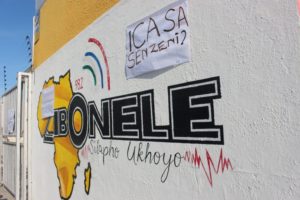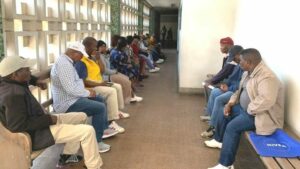
Recent media reporting clearly demonstrates that South Africans are opposed to the bribing, cajoling and influencing of journalists. Whether the bribery comes in a brown envelope or stacks of R200 notes or in other unknown forms, it is contrary to our democracy and a violation of the ethics and standards of journalism .
Research by civil society activists have found that three newspapers – namely The Sunday Times, The Citizen and Biznews – acted in concert to hide the sponsorship by the South African Jewish Board of Deputies (SAJBD) of their tour to Israel. The Board of Deputies, they all eventually admitted, paid for their trips to write “balanced journalism” stories about Israel-Palestine.
These stories appeared during the months of April-May 2025, and when originally published, failed to disclose that the cost of the trips had been sponsored by the SAJBD. This non-disclosure is a breach of the Press Council’s Code of Ethics and Conduct for South African Print and Online Media.
Arena Holdings published in the print edition of the Sunday Times on 20 April 2025, ‘Two sides of a tragedy‘: “On a trip to Israel and the occupied West Bank, S’thembiso Msomi speaks to Israelis and Palestinians in search of answers to the seemingly endless suffering”.
The Citizen published ‘Israel denies whispering in Trump’s ear for sanctions against SA‘ on 10 April 2025 and ‘I don’t believe we pray to the same God – The heartbreaks at the centre of the Gaza conflict‘ on 6 May 2025, both written by journalist, Itumeleng Mafisa, after his trip to Israel.
Sunday Times and The Citizen responded to my complaint in a business-as-usual manner, implying that they did not see it as a serious or gross violation of the code. Biznews, while outside the ambit of the Press Code did “fix” their “error” but failed to show that they were asked to do so.
The two organisations apologised separately but the contents were substantially similar. The Citizen and Sunday Times, confirmed that when the articles were published, they had omitted to say who had sponsored the cost of the trip, in violation of the code, which “prescribes that publications should clearly indicate when an outside organisation has contributed to the cost of newsgathering”. They then wrote that the “trip was in fact sponsored by the SA Board of Jewish Deputies”. Both apologies point out that they had not indicated this sponsorship to their readers at the time. “We have taken steps to avoid such an error in the future,” they concluded.

Journalism 101
The Press Council code the newspapers violated is basic journalism, and it was a fundamental breach of the standards and practice of their craft. I do not buy the story that these media houses have taken steps to avoid what they call “an error”. I believe that this is wilful neglect and the three media houses worked in concert to undermine our democracy. It was not a mistake. It was a conspiracy to undermine the readers and the public at large. Let me explain.
Firstly, in the complaints that I lodged at the Press Council, I argued that all these journalists together have close to 90 years of top level journalistic experience. There was no way these media professionals, if acting on their craft, would make such a mistake. There were other motivations at play.
Secondly, both Sunday Times and The Citizen were in some way involved in the South African National Editors’ Forum (Sanef) inspired Inquiry into Media Ethics and Credibility four years ago.
Subsequent to that inquiry, Sanef hosted on their website Decoding the Code by Johan Retief (adopted 2019). Point 1.10 of this ‘media ethics manual’ states that when the media has to make amends for presenting inaccurate information or comment – which the omission of the SAJBD funding is – it represents a distortion of the news and an implosion of quality journalism.
The author of Decoding advises that when an editor realises that a mistake has been made, the matter should be rectified “promptly” and with “appropriate prominence”. He warns: “The problem, though, is that publications often obfuscate such corrections or apologies by placing a short sentence or two at the bottom of a page, obviously in an attempt to minimise the harm to their image. Clearly, that is against the spirit of self-regulation and of good, sound, ethical journalism.”
The clarification, in particular by Sunday Times, undermines the spirit of self regulation and of good, sound and ethical journalism. I agree with Johan Retief.

Sanctions
Where are we now? I have suggested to the Press Council that The Citizen and Sunday Times must apologise in line with the Press Code.
The Times’s compliance has been inconsistent and both failed to fully correct errors on all platforms. The issue is now with the ombud due to their refusal to hold a public education seminar on their supposed errors, among other “asks”.
Sanctions for Sunday Times: I asked that they must publish a prominent correction in print and online (bold, above the headline), and that the apology must fully disclose how many people from the newspaper the SAJBD funded.
I also asked that the Times “contribute to a good Palestinian cause, and/or donate to the Palestinian victims of Israeli violence (mostly women and children) in Gaza”, and if this was too difficult, to use the services of the Gift of the Givers.
Sanctions for The Citizen: by the time I complained, it was easy to establish that the SAJBD had funded them and I pointed out that their non-disclosure had revealed their editorial support of the genocide.
The ombud must rule per the Press Code. The newspapers’ non-disclosure of SAJBD funding is genocide complicity. They must fund (not via sponsors) a public seminar on the Press Code, ensuring affected communities attend, in person or virtually, for healing.
The Press Council stated that The Citizen opposed the proposed redress measures, while the Times delayed and showed no willingness to address them. The council’s public advocate, Fanie Groenewald noted that The Citizen would apologise but refused further actions like sponsoring a seminar, calling such a sanction “unprecedented” for the Press Council to direct such a sanction. I disagreed, arguing that these redress measures were modest and desirable.
To conclude, I believe that this is a scandal of major proportions and warrants as big a response as the South African Human Rights Council investigation into racism in the media (1998) as well as the inquiry into media ethics and credibility (the Satchwell report). Ritualised apologies and promises of never again are inadequate to address the enormity of the wrong. The fight for ethical journalism is inseparable from the fight for justice in Palestine and beyond.
Hassen Lorgat is a media activist based in Johannesburg





